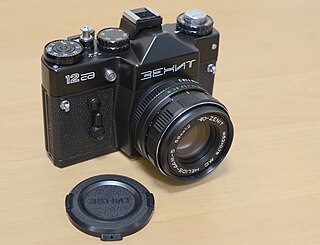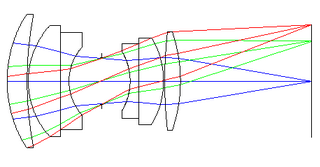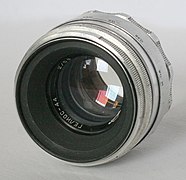
Cosina Co., Ltd. is a manufacturer of high-end optical glass, optical precision equipment, cameras, video and electronic related equipment, based in Nakano, Nagano Prefecture, Japan.

Jos. Schneider Optische Werke GmbH is a manufacturer of industrial and photographic optics. The company was founded on 18 January 1913 by Joseph Schneider as Optische Anstalt Jos. Schneider & Co. at Bad Kreuznach in Germany. The company changed its name to Jos. Schneider & Co., Optische Werke, Kreuznach in 1922, and to the current Jos. Schneider Optische Werke GmbH in 1998.

Zenit (Russian: Зени́т) is a Soviet camera brand manufactured by KMZ in the town of Krasnogorsk near Moscow since 1952 and by BelOMO in Belarus since the 1970s. The Zenit trademark is associated with 35 mm SLR cameras. Among related brands are Zorki (Watchful) for 35 mm rangefinder cameras, Moskva (Moscow) and Iskra (Spark) for medium-format folding cameras and Horizon for panoramic cameras. In the 1960s and 1970s, they were exported by Mashpriborintorg to 74 countries.

The M42 lens mount is a screw thread mounting standard for attaching lenses to 35 mm cameras, primarily single-lens reflex models. It is more accurately known as the M42 × 1 mm standard, which means that it is a metric screw thread of 42 mm diameter and 1 mm thread pitch.

The Pentax K-mount, sometimes referred to as the "PK-mount", is a bayonet lens mount standard for mounting interchangeable photographic lenses to 35 mm single-lens reflex (SLR) cameras. It was created by Pentax in 1975, and has since been used by all Pentax 35 mm and digital SLRs and also the MILC Pentax K-01. A number of other manufacturers have also produced many K-mount lenses and K-mount cameras.

The double Gauss lens is a compound lens used mostly in camera lenses that reduces optical aberrations over a large focal plane.

The M39 lens mount is a screw thread mounting system for attaching lenses to 35 mm cameras, primarily rangefinder (RF) Leicas. It is also the most common mount for Photographic enlarger lenses.

The Sigma SD14 is a digital single-lens reflex camera produced by the Sigma Corporation of Japan. It is fitted with a Sigma SA mount which takes Sigma SA lenses.
The Sigma SA-mount is a lens mount by the Sigma Corporation of Japan for use on their autofocus single-lens reflex and mirrorless cameras. It was introduced with the SA-300 in 1992. Originally, the SA-mount was a dual-bayonet mount with inner (SA-IB) and outer (SA-OB) bayonets, the latter being a feature intended to mount heavy telephoto lenses, but never utilized by Sigma and consequently dropped with the release of the SD14 in 2007.

Lens speed is the maximum aperture diameter, or minimum f-number, of a photographic lens. A lens with a larger than average maximum aperture is called a "fast lens" because it can achieve the same exposure as an average lens with a faster shutter speed. Conversely, a smaller maximum aperture is "slow" because it delivers less light intensity and requires a slower (longer) shutter speed.
The T-mount is a standard lens mount for cameras and other optical assemblies. The usual T-mount is a screw mount using a male 42×0.75 metric thread on the lens with a flange focal distance of 55 mm and a mating female 42mm thread on a camera adapter or other optical component. This thread form is referred to as T-thread.
The Mir series of lenses are Russian camera lenses made by various manufacturers in the former Soviet Union.

This article details lensesfor single-lens reflex and digital single-lens reflex cameras. The emphasis is on modern lenses for 35 mm film SLRs and for "full-frame" DSLRs with sensor sizes less than or equal to 35 mm.
Cosina Voigtländer refers to photographic products manufactured by Cosina under the Voigtländer name since 1999. Cosina leases rights to the Voigtländer name from RINGFOTO GmbH & Co. ALFO Marketing KG in Germany. Cosina Voigtländer products have included 35mm film SLR and rangefinder camera bodies, and lenses for the M39 lens mount, M42 lens mount, Leica M mount, and other lens mounts.

Helios was a type of camera lenses, made in the USSR. They were usually supplied with Zenit cameras and thus usable with other M42 lens mount cameras such as the Pentax Spotmatic. Some later Helios models were built also for the Pentax K mount.
The Jupiter series of lenses are Russian camera lenses made by various manufacturers in the former Soviet Union. They were made to fit many camera types of the time, from pre-WWII rangefinders to almost modern SLRs. They are copied from Zeiss pre-WWII designs with incremental improvements, such as coatings, introduced during production. The majority of them are based on Zeiss Sonnar optical scheme, but that's not a rule.
The Fujica X-mount was a lens mount created by Fujifilm in the late 1970s and early 1980s for the new Fujica SLR lineup: AX-1, AX-3, AX-5, AX Multi, STX-1, STX-1N, STX-2, MPF105X, MPF105XN. It replaced the M42 screw mount used on their earlier SLRs.

Tair is the name of a series of prime lenses manufactured by KMZ in the Soviet Union.

Start was a Soviet 35 mm single-lens reflex camera produced by the Mechanical Factory of Krasnogorsk (KMZ) from 1958 through 1964. The camera was inspired by the Exakta camera. The Start used bayonet-mounted lenses and had an Exakta-style shutter release arm, a KMZ Helios 44-58 mm f/2 lens, and a cloth focal-panel shutter.



















